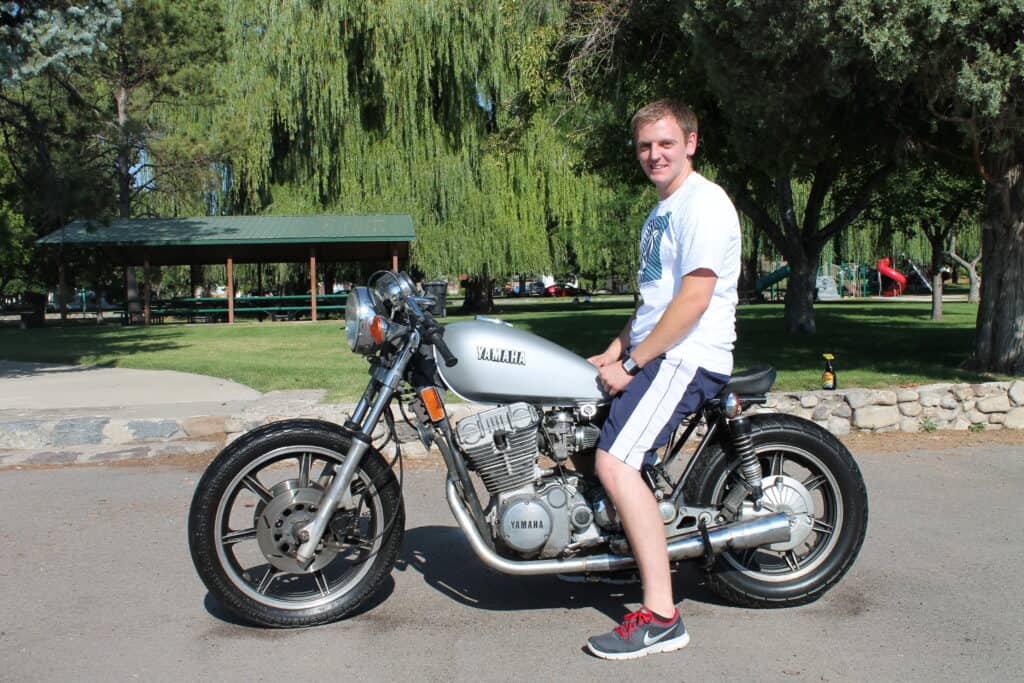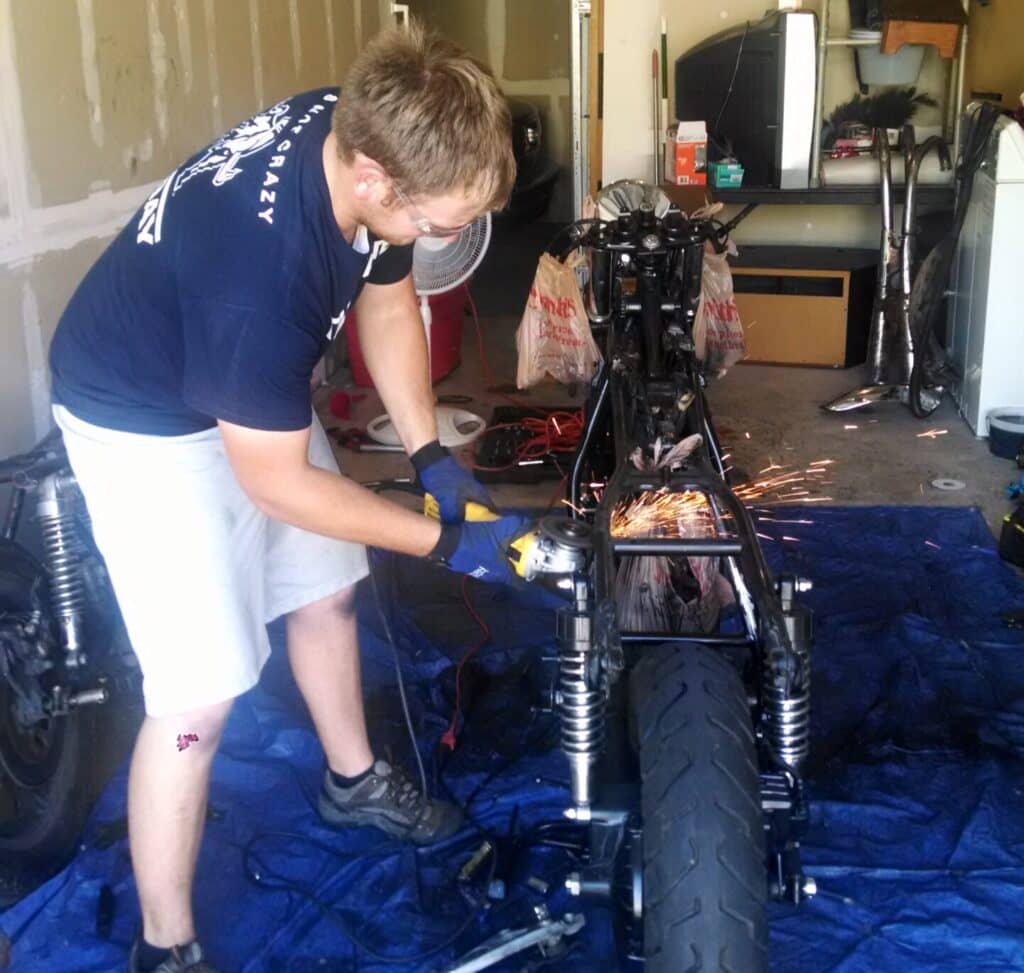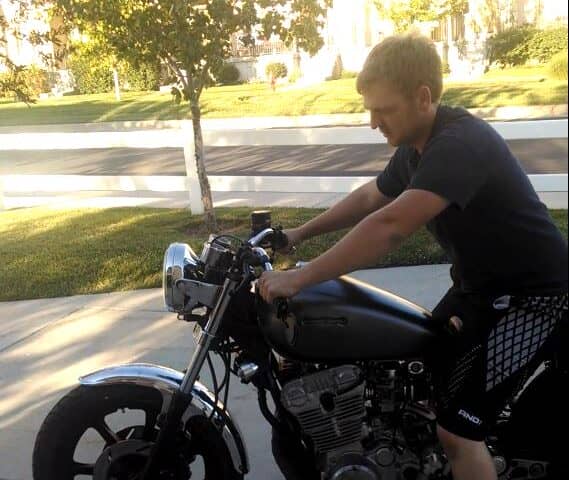
I’ve often heard the questions about whether or not it’s a good idea to get a motorcycle as your way of transportation during college. College is stressful enough, so figuring out what you’re going to use to get you around town shouldn’t have to add to that stress.
I myself had a motorcycle while I attended Utah State University. I studied mechanical engineering so I needed to be at the library a lot. There were so many things I loved about having a motorcycle during college, but there were also a few things I hated. I’ve been able to compile an unbiased, honest list of the pros and cons of having a motorcycle while in college.
Pro To Having A Motorcycle During College: Lower Purchase Cost
The cost of initially purchasing a motorcycle is what convinced me to get one in the first place. In 2013, I got a 1980 Yamaha XS850 for about $800 and fixed it up a little for another $200-$300. It was an older motorcycle, but it still worked great at getting me around town.
When you buy a vehicle, you want to make sure it’s reliable and that it’s not going to leave you stranded both literally and financially. Let’s look at a few numbers comparing the purchase cost of a motorcycle and the purchase cost of a car.
Let’s say you have a budget of $5,000 – $6,000 to buy something that will get you around town. There are plenty of cars to choose from, but it’s not hard to tell that most college students who are buying a car themselves end up choosing a used sedan of some sort. The most common kind of college student car is the Toyota Camry, Honda Civic, Honda Accord, and Nissan Altima.
So we’ll go with a very average car, a 2008 Honda Accord. With an average of 12,000 miles put on it per year, this vehicle is worth about $5,500 in good condition (according to nadaguides.com). Seems pretty decent for a car.
Now let’s look at a motorcycle. Let’s say you get something like a 2008 Kawasaki Ninja 250. According to cycletrader.com, the average retail price of a motorcycle like this is about $1,925.
There can be a lot of comparisons made between less expensive cars and more expensive motorcycles, but this example shows you that it is completely possible to purchase a motorcycle at a much lower price than the average car a college student has.
Some people will argue that with a motorcycle, you need to add the cost of gear to that as well. That is a fair point which is why I’m mentioning it. Don’t ever buy cheap motorcycle gear, especially a cheap helmet. You don’t need to buy the most expensive either, but buy quality gear. Expect to spend about $550 on gear appropriate for the type of riding you’ll be doing. This is the average I spent on gear. Click here to see a list of some recommended motorcycle gear that I use.
With that being said, the purchase of the motorcycle with gear will be about $2,475 which is still $3,025 less than purchasing a car. That $3,025 can take you a long way with groceries as a college student!
In addition, a lot of motorcycle insurance agencies offer some insurance discounts to college students. I received a discount with my insurance simply because I was a part the “Engineers Without Borders” club while attending Utah State University. Click here to see a list of insurance agencies near you and compare rates that work with your budget. Be sure to ask about discounts for college students!
Pro To Having A Motorcycle During College: Less Maintenance
One of the things I love about motorcycles is the fact that they require less maintenance than a car. Motorcycles are a lot more simple than cars so the maintenance that a motorcycle does require can easily be learned by anyone, especially a college student.
The main maintenance a motorcycle requires is checking tire pressure and tire condition, routinely changing the oil, using ethanol-free gas if you have a carburetor, and lubing the chain. If you stay on top of those things, your motorcycle will transport you around town for years to come with minimal trouble.
So let’s talk about the maintenance that’s required on a car. You have the basic things such as routinely changing the oil and checking the tire pressure, but there are hundreds of other things you have to worry about.
If you’re buying a used car, chances are you’ll need to change the timing belt at some point (and that is something you cannot ignore or skip!). The average cost of that is usually around $500 – $700. Then you have to worry about getting the transmission serviced, balancing the tires, getting new struts, address overheating issues, fix air conditioning, etc.
All of those fixes and maintenance you’ll end up doing on a used car will add up to a price most college students can’t afford, especially if the previous owner didn’t take good care of the car before.
Pro To Having A Motorcycle During College: Easier To Work On

Another awesome thing about owning a motorcycle while going to college is the fact that motorcycles are easier to work on compared to cars. When I purchased my first motorcycle, I knew absolutely nothing about them but I was able to quickly learn a lot through trial and error and YoutTube videos.
With an endless reservoir of information at our fingertips (the internet), you can really fix almost anything on a motorcycle yourself if you’re willing to learn and put in the time. Of course, there are several things that do require attention from a mechanic because some fixes require tools that most of us don’t have laying around.
Even then, most issues on a motorcycle fixed by a mechanic are much less expensive than fixes made on a car mostly because of the amount of labor required to get to certain parts.
Pro To Having A Motorcycle During College: Parking
In some cases, parking a motorcycle in a parking lot is a lot easier than it is for a car. All the universities I went to (I transferred between three different schools during my college days) had special parking spots specifically for motorcycles and mopeds.
When you get a motorcycle, that doesn’t mean you can park anywhere you want. A lot of people assume that because they have a motorcycle they can parked on striped lines or on the sidewalk. This is not true and is illegal in most places; you’ll likely get a ticket (and you know how campus police LOVE to give out tickets). You can click here to see an article I wrote about motorcycle parking etiquette.
With that being said, universities still like to make it easy for students with motorcycles to park. When I was going to Utah State University, they had a whole parking lot right in the middle of campus dedicated to just motorcycles and mopeds. That made it incredibly convenient to get to most of my classes every day.
And on top of that, motorcycle parking permits are usually much less expensive than car parking permits. The average I’ve seen with each university I went to was about $85 for a motorcycle parking permit for the year and about $180 for a car parking permit for the year.
Pro To Having A Motorcycle During College: Fuel Efficiency
In addition to the other cost efficient points that have been brought up in this article, we can’t forget to mention the amount you would save on fuel with a motorcycle. And let’s face it, any money you can save in college is usually worth doing.
Motorcycles tend to get much better gas mileage compared to cars because they are smaller vehicles and have better aerodynamics. Motorcycles can get an average of 40-50 miles per gallon.
Of course, a lot of that depends on how big your motorcycle engine is and how much your motorcycle weighs. If your motorcycle weighs less or has a smaller engine, your average gas mileage will increase.
Since we previously mentioned college students getting something like a 2008 Honda Accord, we’ll use that example again. A 2008 Honda Accord gets an average of 20-25 miles per gallon. And sedans are known for their fuel efficiency so anything bigger than that will have worse gas mileage. Motorcycles can save you at least 20 miles per gallon.
Con To Having A Motorcycle During College: Inclement Weather
Now that we’ve discussed some of the best parts about using a motorcycle as transportation while you’re in college, I’ll start talking about some of the downsides there are.
Motorcycles are excellent vehicles to have when the weather is warm. There’s nothing quite like riding through campus during a warm spring or fall day because you feel pretty cool doing so. But if you’re going to school in a place that has harsh winters, having a motorcycle might be a little tough.
Though it’s still possible to ride motorcycles during cold weather, it’s not really advised to do so when the weather is below freezing temperatures. Not only is it potentially hard on your motorcycle, but it can be dangerous riding on the roads that might have ice on them. You can view my article here that discusses more about when it’s too cold to ride a motorcycle.
Sometimes the weather can be unpredictable, too. It’s really frustrating and pretty scary if you’re riding down the road only to find yourself in an unexpected rain or snow storm. Other times you may be in class or in the library studying and come outside to your motorcycle only to find it had snowed a foot outside and you didn’t realize it.
Having attended college at a university in northern Utah, I was often surprised by snow storms in the winter after being in the library for hours and finding my motorcycle covered in snow. There were several times I had to rethink my transportation for the day because of the weather.
Con To Having A Motorcycle During College: Other Drivers Around You
No matter how many safety features you can put on a motorcycle, there’s no going around the fact that you are more susceptible to injuries on a motorcycle than you are in a car.
Cars provide a lot more protection in the case of an accident than a motorcycle does. If you crash on a motorcycle, there’s really nothing holding you back except hopefully the quality gear you’re wearing.
One of the hardest things about riding a motorcycle is that you could be the very best rider out there, but other drivers can be completely unaware of you and cause some sort of accident. Driver’s Ed teaches drivers to be aware of their surroundings, but it doesn’t teach drivers near enough about being aware of motorcyclists.
According to the Insurance Information Institute, 82,686 motorcycles were reported to be involved in injury crashes in the United States in 2021. Of all motorcycle accidents that involve cars, cars account for 42% as the at-fault party. This is usually from the cars making left hand turns.
Now I’m not saying that riding a motorcycle is a dangerous sport and shouldn’t be done. This point is to demonstrate the lack of knowledge that other drivers have around motorcyclist; I can’t make a list like this without mentioning theses types of risks.
Con To Having A Motorcycle During College: Less Room For Storage

As I had mentioned before, motorcycles have better aerodynamics which makes them more fuel efficient. But those aerodynamics come at a cost.
When you ride a motorcycle as a college student, you’re pretty limited on the amount of stuff you can take with you. When I rode my motorcycle, I would usually take my backpack and the contents in it with me and that’s it. This was simply because I couldn’t fit anything else on my motorcycle.
Going grocery shopping can be a bit of a hassle with a motorcycle and grocery shopping is something you’re going to have to do while in college. Even going through the drive through and getting take-out isn’t easy on a motorcycle unless you have some sort of bag or basket attached to your bike.
A lot of times I had to hitch rides with roommates or friends to the grocery store in order to get all the groceries I needed and not worry about fitting it all on my motorcycle. If you own a motorcycle while going to college, you’re probably going to need occasional help from someone who has a car.
If you’re wondering where to store your registration on a motorcycle, see my helpful article I wrote by clicking here that describes exactly how you can do this.
Con To Having A Motorcycle During College: Possibility Of Theft Increases
Motorcycles are, unfortunately, already susceptible to theft. They’re easy to access and if needed, someone can bring a buddy and simply lift it into the back of their truck and get it started later.
Thieves have started taking a certain liking to college campus motorcycle parking lots. It makes sense; a campus motorcycle parking lot has a slew of motorcycles for them to choose from. A seasoned thief can get a bike going in as little as 30 seconds without anyone even realizing it. And campus police are none-the-wiser because they don’t keep track of who owns what motorcycle.
It’s not just a risk of the motorcycle being stolen, but also anything you leave on your motorcycle can get stolen as well. If you have any bags or baskets on your bike and leave anything in them, that’s a perfect invitation for someone to take it.
There are a few safety measures you can take that will make your motorcycle less appealing to thieves. Make sure to use a lock on one or both of the wheels. If possible, chain it to something immobile such as a stationed bike rack. Putting a cover over the motorcycle seems excessive, but if you do that thieves may be tempted to look elsewhere for something they can already see.
Click here to see a list of security products I recommend for motorcycles to prevent theft. Some of these items could be very beneficial for college students who use a motorcycle.
Con To Having A Motorcycle During College: More Confined To Shorter Commutes
This last con I’d like to point out may not be applicable to everyone depending on their riding skills and willingness to ride long distances. Having a motorcycle tends to confine you to just riding around the city you live in.
I never rode my motorcycle long distances. The college I was attending was over a four hour drive in a car from where my family was. There was also a dangerous canyon getting there so I never attempted to ride my motorcycle home in those conditions.
Road trips are absolutely doable in a motorcycle, but you usually have to have the right type of bike such as a touring motorcycle. You can do long trips on other motorcycles, it just won’t be as comfortable and you may not be able to take as much stuff with you.
College students usually aren’t taking long road trips unless it’s during some break. But college students do like to go out to places during the weekend that may be further than 50 miles. Some people may be uncomfortable with doing that on a motorcycle.
Conclusion
As you can see, there are pros and cons to owning a motorcycle while going to college. Those benefits include low purchase costs, minimal maintenance and easy to work on, they’re fuel efficient, and parking is much more accessible on college campuses. The negatives to using a motorcycle during college include inclement weather, susceptibility to accidents, minimal storage, and higher possibilities of theft.
Having owned and ridden a motorcycle while I was going to college, I was able to see first-hand what that experience was like. Personally, I found using a motorcycle during these years were hugely beneficial and I would absolutely do it again. But tell me what you guys think! Did any of you ride a motorcycle while going to college? Or, are you going to college and thinking about purchasing a motorcycle? Feel free to message me with questions, I’m more than happy to help!
Related Question
Can you write off a motorcycle on taxes? The ability to write off a motorcycle on your taxes depends entirely on the reason you use your motorcycle. If you use your motorcycle for work or business related matters, then yes, you can write off your motorcycle expenses on your taxes. Your motorcycle cannot be tax-deducted if it is for personal use.
